
Kidney stones are solid masses that form when waste materials collect and crystallize due to the insufficiency of fluids in the body. Kidney stones usually originate in the kidneys but they can move anywhere in the urinary tract.
Low fluid intake, high protein diet, foods rich in oxalate, excess salt, excess body weight, etc. are some of the major causes of kidney stones.
Kidney stones can be quite troublesome and painful. These stones tend to cause excruciating pain in the lower back. Other common problems associated with kidney stones include burning sensation while urinating, frequent urge to urinate, dark-colored urine, etc.
Table of Contents
Does exercise help in kidney stones?
You should be aware that exercise plays an important role in the proper functioning of the human body. Regular exercise helps to ensure that all the body organs function properly.
In the case of kidney stones too, exercise can be very effective. Exercise improves the working of the kidneys and thereby helps in a number of kidney-related ailments.
Regular and mild exercise reduces the chances of developing kidney stones in the first place. A study conducted on about 85,000 women established a direct link between regular exercising and reduced risks of kidney stones. According to the study results, women who exercised regularly had a 31 percent reduced risk of kidney stones.
As such, there is no specific exercise that is recommended for the purpose. Just staying active is the key. You can take a 30-minute walk, jog a little, or do a little cardio. The chances of kidney stones depend upon the amount of exercise, not the intensity.
How effective is exercising for kidney stones?
Exercise helps in maintaining the overall fitness of the body. Regular exercise keeps obesity, cholesterol, and blood pressure in check. Since these are the risk factors for kidney stones, it is easy to establish that exercising can prevent kidney stones to a considerable extent.
Also, if you exercise regularly, it helps in maintaining the levels of salt, calcium, and minerals in the body. This will ensure that the excess oxalates, salt, and minerals are flushed out of the body thereby preventing them from crystallizing. Exercise will also divert the excess calcium to the bones. This will prevent it from combining with the oxalate to form calcium oxalate, the major constituent of kidney stones in most cases.
Additionally, moderate exercises also help in improving kidney function. Regular moderate exercise increases the blood circulation to the kidneys which in turn improves the filtering process. Low-intensity workouts for kidney stones, if performed regularly, significantly help in filtering out urea more efficiently. Aquatic exercises and aerobics can be really beneficial to prevent.
Exercise can also be very effective in case you already have kidney stones. Regular exercises help to prevent further enlargement of the stone. Mild exercises like jogging and skipping can reduce the chances of salts and minerals sticking to the stone, thereby keeping the size of the stone in check.

Regular exercise also aids in the process of passing small kidney stones through the urine naturally. In some cases, the stones do not travel through the urinary tract on their own and stay in one place. This means that they cannot be removed from the body without external aid. In such cases, normal exercises can help facilitate the movement of the stones so that they can be flushed out of the body through the urine.
Yoga exercises for kidney stones
Apart from other workouts, yoga exercises can also be very helpful in the condition of kidney stones. Yoga asanas like Garudasana, Ushtrasana, Bhujangasana, etc. can be very effective in preventing kidney stones as well as in providing relief from the pain and troubles of kidney stones.

Exercising is also considered to prevent Chronic Kidney Disease (CKD) by keeping its risk factors like blood pressure, heart ailments, cholesterol, obesity, type 2 diabetes, etc. in check.
Other healthy changes that help in getting rid of kidney stones
Along with exercises, you need to ensure that you stay hydrated at all times. Remember to drink a lot of fluids as dehydration caused due to the workouts can further aggravate the symptoms of kidney stones.
Drink enough water before, after, and during the workout. Certain beverages like cranberry juice and lemonade can be taken as they will keep you hydrated and will also help in breaking the stones.
Certain dietary changes can also aid the process. For improved results, you should reduce the intake of salt, minerals, and oxalate-rich foods. Moreover, try to avoid preserved and processed foods as they can put extra pressure on the kidneys.
Also Read: Foods to avoid with Kidney Stones
It is important to discuss the exercises with your doctor. Usually, exercises that can strain the abdomen and the kidneys are not recommended. Strenuous activities can lead to stones irritating the walls of the urinary tract. Such heavy physical activities can worsen the pain due to kidney stones.
You must have understood by now that proper and regular exercise along with necessary changes in the diet and lifestyle, can do wonders in providing relief from kidney stones. However, if any of the exercises cause the worsening of the condition, discontinue the exercise and contact your urologist immediately.
Seeking medical help for kidney stones is strictly recommended

If your kidney stone is small to medium-sized, your kidney stone doctor may prescribe some medication for kidney stones that will help in the passing of the stone. In the case of large stones or multiple stones, your doctor may suggest surgical treatment.
Fret not, as the advanced procedure of shock wave lithotripsy is now available for kidney stones treatment. The procedure is not much invasive, and it does not inflict any pain. It is a modern procedure and has a high success rate.
Shock Wave Lithotripsy is available at Pristyn Care. If you have any questions about the procedure, you can contact us and we will resolve them for you.
Also Read:








